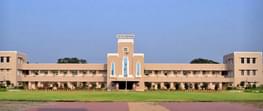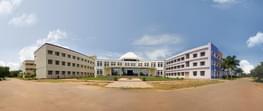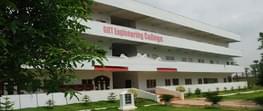Dr. B Krishna Kanth is the Head of the Department of Agricultural Engineering at Aditya Engineering College. He holds an M.Tech. Degree in Farm Machinery and Power Engineering from Jawaharlal Nehru Krishi Viswa Vidyalaya and a Ph.D. from Acharya N.G. Ranga Agricultural University. He has over 06 years of experience and her areas of interest are Precision Farming, Plant Protection, Automation, and Machine Design. Dr. B. Krishna Kanth has written 07 papers in reputed international and national journals. He has also presented four papers at international and National conferences. Besides membership at ISAE, he has also received the best article award.

Being a HOD of the Agricultural Engineering Dept., what are your roles and responsibilities towards the students?
Supervise academic activities, assign staff duties as per regulations, and monitor performance. Submit reports related to workload, syllabus, and attendance, etc., Ensure timely completion of theoretical, practical courses and lab maintenance. Strive for departmental excellence and maintain professional interactions.
How do you tend to establish healthy relations with the students and fellow faculty?
I maintain healthy relations with students and faculty by organizing activities, listening to their concerns, celebrating their achievements, and working as a team.
How do you try to bring in a practical approach towards subjects and make them industry-oriented?
As head of the department, prioritize practical, industry-focused curriculum emphasizing precision farming and sustainability. Establish partnerships for internships and collaborative projects. Enhance hands-on learning through labs and field studies. Engage faculty in professional development and encourage student projects addressing industry needs. Provide career guidance and networking opportunities.
What are the best practices offered by the department to the students that help them gain the necessary skills?
The Agricultural Engineering Department emphasizes hands-on learning, industry exposure, interdisciplinary studies, research opportunities, and soft skills development. Students gain practical experience in labs and field studies, engage with industry through internships and collaborations, and develop a holistic understanding of agricultural systems. They are trained in programming, sustainability, and emerging technologies, and are guided in career navigation and industry expectations. This approach aims to produce adaptable graduates with both technical proficiency and practical skills.
How do you strategize the curriculum and how often does it get updated to make it befitting for the students?
The Agricultural Engineering Department curriculum development strategy involves industry engagement, faculty collaboration, and stakeholder feedback. It balances theoretical knowledge with practical applications, adapts emerging technologies, and integrates cutting-edge resources. Regular reviews and continuous assessments ensure the curriculum’s relevance and effectiveness in preparing students for industry demands.
Check Aditya Engineering College Reviews
What are your views on the placements and higher education of the students from your department and how does your department prepare students for Higher education?
The department focuses on student placements and higher education. It offers career counseling, resume building, and mock interviews for job readiness, and facilitates industry internships. Guidance on postgraduate programs, scholarships, and research opportunities prepares students for advanced studies. Faculty mentorship, a research-oriented curriculum, and academic events encourage further education in agricultural engineering.
How do you help your student cope with the competition being so high in the outside world?
The department supports students in the competitive landscape by fostering growth, resilience, and learning. It guides students on career paths, networking, and skills, and enhances their practical experience and competitiveness. It also empowers students with interviews, soft skills, and entrepreneurship training. It instills confidence, provides resources, and nurtures a supportive environment.
Do you have any extracurricular activities/ programs to enhance the skills of the students or expose them to real-world challenges?
The department offers extracurricular activities and programs to enhance skills and real-world exposure. These include student clubs, workshops, seminars, hackathons, competitions, challenges, internships, exchange programs, outreach programs, and collaborative projects. These activities supplement classroom learning, developing a comprehensive skill set and practical experience for the professional world.
What are the challenges you faced/ are facing to uplift the quality of education in your department?
Our Agricultural Engineering Department is adapting to changing educational policies and regulations, requiring flexibility and coordination. We’re also addressing faculty recruitment, curriculum relevance, online learning adaptation, assessment, research-teaching balance, diversity, technological infrastructure, and student well-being. We’re confident in overcoming these challenges gradually.
When you came to college, what was your vision and how are you trying to achieve the same?
I envisioned an inclusive, innovative, and curious academic environment that transcended boundaries and applied learning to real-world problems. I advocated for curriculum enhancements that emphasized hands-on, collaborative, and industry-linked experiences. I instilled a culture of continuous learning, critical thinking, diversity, and passion. I aimed to equip students with knowledge, skills, and mindset to thrive in a changing world, aligning with my initial aspirations.

![Aditya Engineering College - [AEC]](https://image-static.collegedunia.com/public/college_data/images/logos/1591109396Annotation20200602201850.jpg?h=71.7&w=71.7&mode=stretch)












![Aditya College Of Engineering and Technology - [ACET]](https://image-static.collegedunia.com/public/college_data/images/appImage/15251_app image aditya.png?h=111.44&w=263&mode=stretch)



![Kakinada Institute of Technology and Science - [KITS]](https://image-static.collegedunia.com/public/college_data/images/appImage/28530_KITS.jpg?h=111.44&w=263&mode=stretch)














![Aditya Engineering College - [AEC]](https://image-static.collegedunia.com/public/college_data/images/logos/1591109396Annotation20200602201850.jpg?h=72&w=72&mode=stretch)








 (1).png?h=72&w=72&mode=stretch)
.jpeg?h=72&w=72&mode=stretch)
.png?h=72&w=72&mode=stretch)
.png?h=72&w=72&mode=stretch)
![GMR Institute of Technology - [GMRIT]](https://image-static.collegedunia.com/public/college_data/images/logos/1479966276logo.png?h=72&w=72&mode=stretch)

![Aditya College Of Engineering and Technology - [ACET]](https://image-static.collegedunia.com/public/college_data/images/logos/1480059954logo 564.png?h=72&w=72&mode=stretch)
![Prasad V. Potluri Siddhartha Institute of Technology - [PVPSIT]](https://image-static.collegedunia.com/public/college_data/images/logos/1738573649logocollege.png?h=72&w=72&mode=stretch)
![Anil Neerukonda Institute of Technology & Sciences - [ANITS]](https://image-static.collegedunia.com/public/college_data/images/logos/1591266477Logo.jpg?h=72&w=72&mode=stretch)
![Godavari Global University - [GGU]](https://image-static.collegedunia.com/public/college_data/images/logos/1708510162channels4profile.jpg?h=72&w=72&mode=stretch)


![Vignan's Institute of Information Technology - [VIIT]](https://image-static.collegedunia.com/public/college_data/images/logos/148007135655.jpg?h=72&w=72&mode=stretch)
![Sri Vasavi Engineering College - [SVEC]](https://image-static.collegedunia.com/public/college_data/images/logos/1480324648vasavi logo.gif?h=72&w=72&mode=stretch)

![Vishnu Institute of Technology - [VIT]](https://image-static.collegedunia.com/public/college_data/images/logos/1480310942logo.png?h=72&w=72&mode=stretch)
![Raghu Engineering College - [REC]](https://image-static.collegedunia.com/public/college_data/images/logos/1480399520newnew logo.jpg?h=72&w=72&mode=stretch)
![Sagi Ramakrishnam Raju Engineering College - [SRKR ]](https://image-static.collegedunia.com/public/college_data/images/logos/1697801139logo1.png?h=72&w=72&mode=stretch)
![Lakireddy Bali Reddy College of Engineering - [LBRCE]](https://image-static.collegedunia.com/public/college_data/images/logos/1417085821LOGO123.jpg?h=72&w=72&mode=stretch)
![Gudlavalleru Engineering College - [GEC]](https://image-static.collegedunia.com/public/college_data/images/logos/1417412725zoutons-online-coupons.png?h=72&w=72&mode=stretch)

Comments